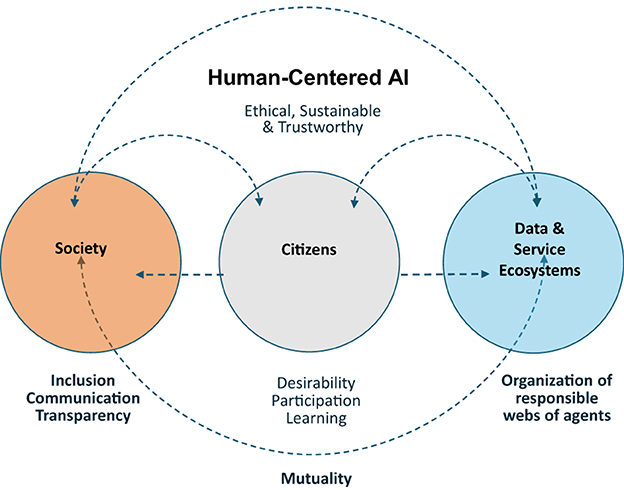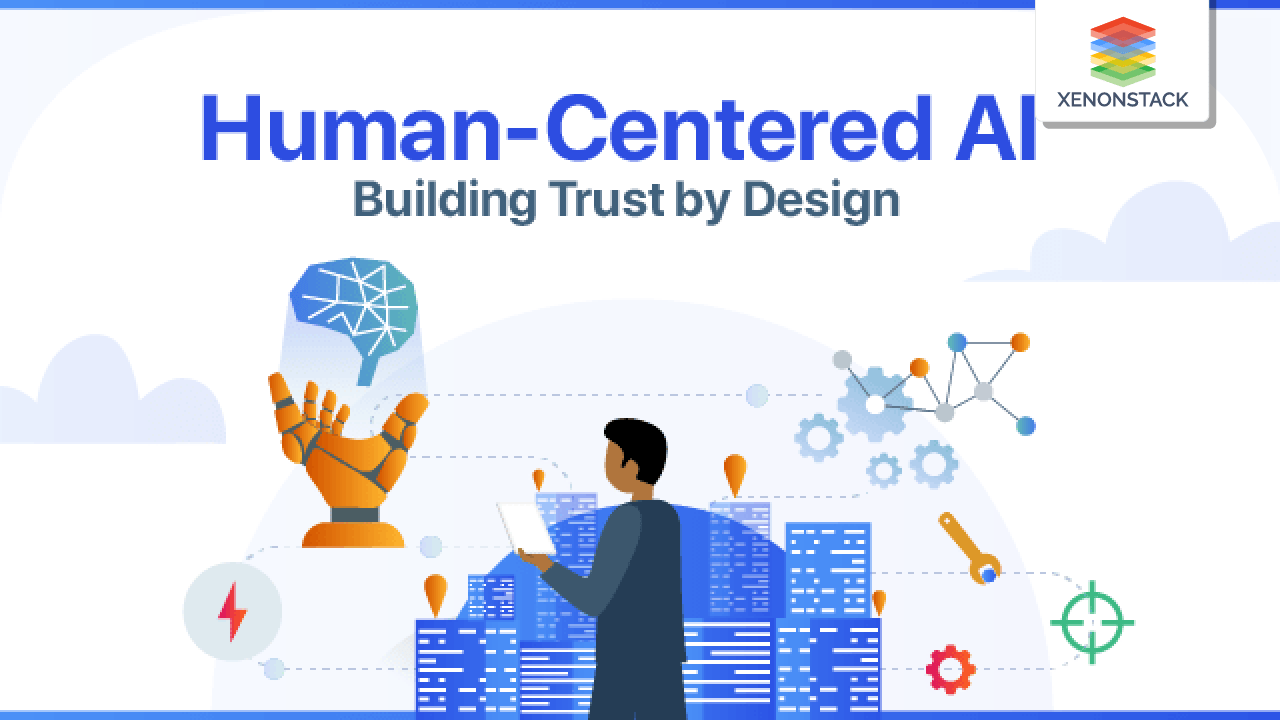Towards a Human-Centered AI Transformation: Redefining the Connection In Between Humans and Intelligent Machines
In this paper, entitled "Towards a Human-Centered AI Change: Redefining the Relationship In Between People and Intelligent Makers," we dive into the current landscape of AI, discovering the honest considerations in its growth. By empowering human-AI collaboration and redefining the function of AI in society, we aim to describe a course in the direction of a much more unified and helpful coexistence between humans and smart machines.
Recognizing the Current Landscape
The existing landscape of human interaction with intelligent devices can be best understood with a comprehensive evaluation of existing AI applications and their influence on numerous sectors. Expert System (AI) has rapidly became a transformative pressure across multiple industries, revolutionizing the means we live and function. From health care and money to transport and manufacturing, AI applications have penetrated almost every element of our culture.
In medical care, AI-powered formulas are being used to diagnose conditions, predict person outcomes, and even aid in surgical procedures. These technologies have the possible to dramatically enhance client care, lower medical mistakes, and boost total effectiveness in healthcare distribution.
In financing, AI is transforming the means we make investment choices, automate trading, and identify illegal activities. Maker discovering algorithms can evaluate large amounts of economic information in real-time, enabling even more exact predictions and much better risk management.
Transportation is one more area where AI is making considerable strides - human centric ai. Self-driving cars and trucks are coming true, with firms like Tesla and Waymo leading the means. AI-powered systems are making it possible for more secure and more efficient transportation, lowering crashes and web traffic blockage
In manufacturing, AI is reinventing manufacturing processes with making use of robotics and automation. Intelligent makers can perform complicated jobs with accuracy and rate, bring about increased productivity and expense financial savings.
These instances highlight the diverse array of AI applications and their effect on different markets. Recognizing the existing landscape is essential for businesses, individuals, and policymakers to harness the complete capacity of AI while addressing its moral, lawful, and social implications.
Moral Factors To Consider in AI Advancement

Another ethical problem is the fairness and transparency of AI algorithms. AI systems typically count on large amounts of information to make choices, and if this information is biased or incomplete, it can result in discriminatory end results. Designers need to make sure that their algorithms are reasonable and unbiased, which they do not bolster existing predispositions in society.

Privacy is likewise a significant moral consideration in AI advancement. AI systems often need accessibility to personal data to operate efficiently, yet this raises worries about data personal privacy and protection. Developers require to execute durable personal privacy actions and ensure that customer information is protected and used responsibly.
Finally, there is a moral duty to make certain that AI systems are not used for malicious functions. AI innovations have the prospective to be used for surveillance, cyberattacks, and other harmful tasks. It is essential for designers to prioritize the growth of AI systems that are safe and immune to misuse.
Humanizing AI: Empathy and Emotional Intelligence
To effectively humanize AI, developers have to purposely cultivate compassion and psychological knowledge in their smart equipments. Empathy refers to the capacity to comprehend and share the sensations of others, while emotional knowledge includes the ability to acknowledge, comprehend, and take care of feelings, both in oneself and in others. Including these qualities into AI systems can considerably boost their capacity to connect with humans in a more natural and purposeful way.
By instilling empathy in AI, programmers can create devices that can responding and acknowledging to human feelings. This can be achieved through the use of all-natural language processing and sentiment evaluation techniques, enabling AI systems to recognize the emotional nuances in human communication. By precisely interpreting emotions, intelligent devices can much better customize their responses, using compassion and assistance when required.
Furthermore, emotional intelligence in AI can allow equipments to adjust their actions based on the mood of the customer. For instance, an AI aide can identify indications of frustration or sadness in a user's voice and respond with patience and compassion, supplying helpful suggestions or words of motivation.
Developers can look at this website cultivate compassion and emotional knowledge in AI systems through the usage of equipment discovering algorithms. By educating AI models on datasets that consist of psychological hints and reactions, equipments can discover to identify and suitably respond to human feelings. Additionally, continuous research in affective computing and affective neuroscience can give beneficial Home Page understandings right into the development of emotionally smart and understanding AI.
Encouraging Human-AI Collaboration
Efficient cooperation in between human beings and AI can be empowered with the critical assimilation of their respective strengths and abilities. The capacity of human-AI partnership depends on harnessing the one-of-a-kind abilities of both celebrations to accomplish premium outcomes. People bring creativity, intuition, and contextual understanding, while AI brings computational power, data analysis capacities, and rate. By incorporating these toughness, we can develop a cooperative connection where humans and AI interact to solve intricate troubles, make notified choices, and drive technology.
To equip human-AI collaboration, it is crucial to create AI systems that are easy to use, clear, and explainable. This indicates creating instinctive interfaces that facilitate seamless interaction in between humans and AI formulas (human centric ai). Additionally, AI designs need to be clear, offering individuals with understandings right into just how decisions are made and allowing them to trust fund and confirm the outputs
Moreover, equipping human-AI collaboration needs recurring training and upskilling of human employees. This requires providing education and resources that allow individuals to comprehend and successfully utilize AI systems. By encouraging people with the understanding and abilities to leverage AI's capabilities, we can ensure a harmonious collaboration that takes full advantage of the capacity of both parties.
Redefining the Duty of AI in Culture
The redefinition of the role of AI in society demands a thoughtful and extensive exam of its influence and potential. As AI technologies continue to development and end up being extra incorporated right into various aspects of our lives, it is important to think about just how they can best offer culture and resolve the obstacles we encounter.
One element of redefining the duty of AI in culture includes making certain that it is used as a device to boost human capacities instead than change them. Collaborative approaches, where humans and AI collaborate, can bring about cutting-edge services and better end results. This needs a shift in state of mind from checking out AI as a threat to welcoming it as an useful source that can support human undertakings.
An additional important factor to consider is the ethical usage of AI. As AI systems come to be more independent and capable of making independent choices, questions develop regarding openness, accountability, and fairness. It is crucial to establish honest standards and regulatory frameworks to protect against the misuse of AI and guarantee that it straightens with social worths.
Additionally, the function of AI in attending to societal difficulties such as medical care, environment adjustment, and hardship must be discovered. AI has the prospective to contribute substantially to these locations by allowing far better data analysis, forecast versions, and targeted treatments.
Final Thought
In final thought, the connection between humans and intelligent machines is advancing in the direction of a much more human-centered AI revolution. The current landscape calls for honest considerations in AI development to make certain liable and responsible use. The humanization of AI, via empathy and psychological knowledge, can enhance its ability to respond and comprehend to human needs. Empowering human-AI cooperation can lead to more reliable and effective results. Inevitably, redefining the role of AI in society can add to a future where human beings and intelligent makers interact for the betterment of society.
In this paper, entitled "Towards a Human-Centered AI Revolution: Redefining the Relationship Between Humans and Intelligent Machines," we delve into the present landscape of AI, checking out the ethical considerations in its development. By encouraging human-AI cooperation and redefining the function of AI in society, we intend to detail a path towards an extra valuable and harmonious coexistence in between people and intelligent equipments.
